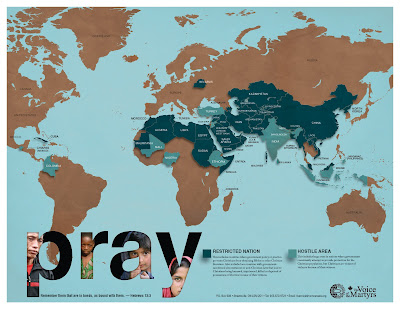By Carl Moeller, Open Doors USA. Article posted at Christianity.com.
As much of the world becomes more dangerous for Christians each day, many in the persecuted church defy the threat of terrorist violence and arrest by religion police simply by worshipping as a community of believers.
Last year violence marked Christmas celebrations in Egypt for the second consecutive year. Just days before Coptic Christians celebrated Christmas (Jan. 7 on the Julian calendar Coptic Christians use), as midnight Mass adjourned at a church in Alexandria, Egypt, a suicide bomber killed 24 Christians. Approximately 100 were injured in the New Year’s Day massacre. Militant Islamists also murdered six Christians and wounded nine others as they left Christmas Eve services at St. John’s Church in Nag Hammadi, Egypt.
In Jos, Nigeria, last Christmas Eve the al Qaeda-affiliated Boko Haram terrorist group killed at least 86 Christians with bombs and attacks that primarily targeted worship services. The victims included church choir members hacked to death with knives. On Christmas Day last year in the Philippines' Sulu province, Islamists detonated a bomb inside a chapel, injuring a priest, a 9-year-old girl and nine others.
Christmas is a favorite time for Iran's religion police to harass Christians. Two years ago Iran's mutaween, or religion police, carried out a wave of arrests of Christians, jailing dozens in a sweep of house churches in the days surrounding the holiday. On Dec. 23, 2009, in Mosul, Iraq, a bomb exploded near a church, killing two people; in Mosul on Christmas Eve, Islamists shot a Christian to death at his home.
In a season that for Christians represents great joy and peace, prevailing tension and strife may squelch the celebration. Christmas, like Easter, represents a window for abuse of Christians by persecutors. Believers in Iraq told me that in recent years even hanging traditional decorations in their homes has proven increasingly risky because it draws up reservoirs of hatred toward the church. That's why some Christians in Iraq and elsewhere have curtailed visible observation of Christmas such as lights, decorated trees and Nativity scenes.
This year Christians in the Middle East will mark Christmas for the first time since Arab Spring uprisings toppled entrenched dictators Hosni Mubarak of Egypt and Moammar Gadhafi of Libya. As popular revolts geared up last year over Christmas we saw no decrease in violence against Christians. Indeed, attacks on Egypt's Coptic Christian minority have soared, even perpetrated by that nation's military.
Unrest continues in much of the region. Violence targeting believers is ongoing in far-flung places around the globe such as Iraq, India, Nigeria, Sudan and Indonesia. Christians are experiencing persecution in Vietnam, Burma and China. In mid-December North Korea threatened to bomb Christmas trees that South Korean Christians had erected at the nations' volatile border. Turkish authorities have uncovered a sweeping al Qaeda plot to bomb all churches in Turkey's capital, in addition to the Turkish Parliament and U.S. Embassy.
We are never privy to what lies around the bend, but we can pray to the Lord who is. As we hear the Christmas songs of joy and peace, we must remember the persecuted and support them through concerted prayer. Pray that new governments replacing toppled dictators in Egypt, Libya and Tunisia will give Christian minorities a proper and protected place in society. Pray that the hope that led to the Arab Spring uprisings will produce real fruit in the form of true freedom of worship. Should violence erupt, may Christians be protected.
Though the signs for Christians in places hostile to the gospel are not encouraging, the Holy Spirit can redeem any situation for God's glory. May the redemptive power of the baby Jesus born in Bethlehem transform these fears into a season of great hope and true peace.


No comments:
Post a Comment
Note: Only a member of this blog may post a comment.